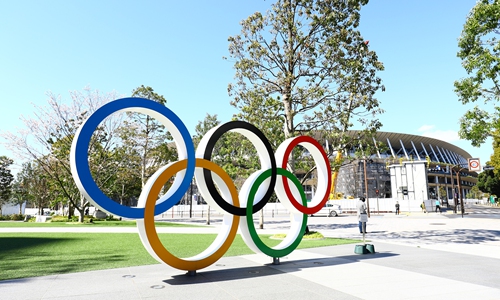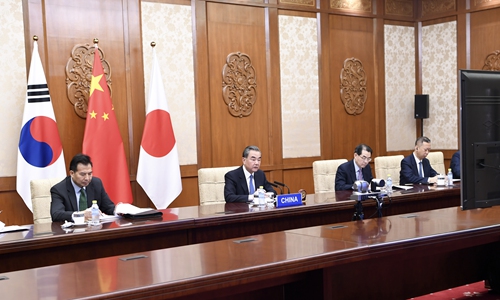HOME >> CHINA
Japan's state of emergency over COVID-19 one week too late, but helpful: experts
By Xu Keyue and Xing Xiaojing Source:Global Times Published: 2020/4/7 19:55:47

Photo: VCG
The Japanese government's declaration of a state of emergency over the spread of COVID-19 was one week too late and its failure to prevent and control an imported COVID-19 epidemic from Europe and the US in a timely manner contributed to explosive growth of COVID-19 cases in Tokyo, observers said.
Japanese Prime Minister Shinzo Abe declared Tuesday a monthlong state of emergency for Tokyo and six other prefectures including Kanagawa and Osaka prefectures.
The measures will go into effect on Wednesday and be in place until May 6 in response to the coronavirus spread, the first such declaration issued in the country, the government announced.
From tomorrow, residents should avoid unnecessary outings, schools and nursing facilities should close, concerts and sports games are restricted, the government enjoys priority in medical and food purchases and the government can requisition land and buildings for temporary medical facilities, according to Japanese news reports.
Unlike earlier measures adopted for coronavirus-devastated Chinese city Wuhan, the Japanese measures are mostly not mandatory and no punishments are outlined for people and organizations who refuse to comply.
Tomoo Marukawa, professor at the Institute of Social Science of the University of Tokyo, told the Global Times that he believed the declaration was one week too late as confirmed cases in Tokyo were on the verge since last week of "explosive growth" at a daily rate of 15.2 percent.
The government last week should have further restricted public activities and taken forcible measures, Marukawa said.
A total of 242 more cases were confirmed in Japan from 10 am Monday to 10 am Tuesday, bringing the total to 4,107, Japanese NHK reported. Some 712 confirmed cases were also reported on the Diamond Princess cruise ship when quarantined in Japan.
Marukawa believed the declaration could reduce the flow of people.
Liu Junhong, a research fellow at the China Institutes of Contemporary International Relations, said that the Japanese government made a mistake for failing to prevent and control imported cases "from European countries and the US."
COVID-19 infections have surged in the US since March, almost at the same time as those in Japan, Liu told the Global Times.
People from Japan and the US "have had close contacts" during the outbreak, Liu said.
Japan requested March 26 that people from the US take a 14-day quarantine at designated points, media reported.
Takayuki Miyazawa, associate professor at the Institute for Frontier Life and Medical Sciences of Kyoto University, also urged the government to strengthen the prevention of imported cases from Europe and the US.
New Japanese graduates had flocked to those areas, he said.
Japanese Nikkei.com reported April 1 that at least 27 students of Kyoto Sangyo University were infected with the coronavirus after some travelled to Europe.
Chinese nationals in Japan reached by the Global Times remained cautious and reserved about the effect of the declaration.
Meng Shuoyang, a doctoral student at the University of Tokyo said many Japanese students studying in Europe and the US chose to fly back and that could increase the imported cases because people from abroad entering Japan were not requested to go to a central quarantine, which raised the risk of local spread.
Meng said he was skeptical about whether Japanese companies would obey the emergency measures and require employees to work from home.
But the traditional Japanese character to avoid troublemaking would encourage residents to follow the regulations, Meng noted.
A Chinese graduate surnamed Liu of Waseda University, a private research university in Shinjuku, Tokyo said she felt "more people are realizing the urgency and seriousness of the epidemic."
But Liu said she was not optimistic about the fight against the epidemic in the country as many young people were still "ignorant, such as cheering out without wearing masks."
Masks and disinfectant also remained in short supply in Japan, said Liu.
Posted in: DIPLOMACY
